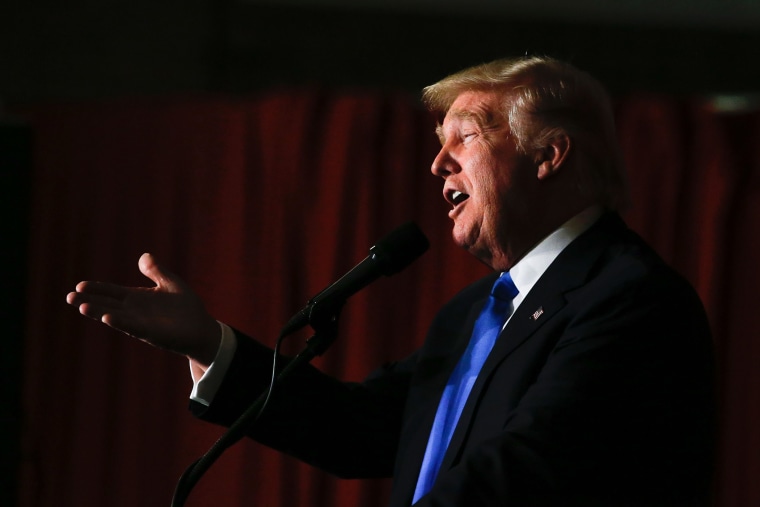Presumptive Republican nominee Donald Trump wants to rewrite the electoral map.
"I will win states that no Republican would even run in," he told the Associated Press this month.
But is it realistic? Can the bombastic billionaire rewrite decades of political realities?
Political strategists – and the Trump team – believe the billionaire mogul’s strong appeal among white, blue collar workers is likely to put states Democrats have dominated for decades back into play, giving the country and its two parties a whole lot more swing states to compete in.
The campaign is staffing up in states Republicans haven’t won in a presidential election for at least 24 years -- Pennsylvania, Minnesota, Maine, Wisconsin and Michigan, according to the AP – in hopes of expanding 2016’s battlegrounds.
“It’s always been like, great, Pennsylvania is gonna be a battleground state,” said David Urban, a Republican lobbyist and former chief of staff to the late Sen. Arlen Specter, of his party’s attempts to compete in the state—despite the GOP losing it in every presidential election since 1992. “It’s kinda like and Lucy and Charlie Brown with the football.”
But Urban, who is volunteering for the Trump campaign, said this year is different.
“It’s hard to overstate how popular Donald Trump is in the state,” he told NBC News. “Back in Western Pennsylvania, on the street where I grew up on, there’s union members, teachers, steelworkers and lots of Trump signs.”
Pennsylvania, in particular, seems primed to turn red. In the Republican primary, Trump won every county and nearly all of the directly elected delegate positions – aided in part by 180,000 new Republican voters.
RELATED: Donald Trump has a surrogate problem
The state has been leaning red for years, too. While Barack Obama won by 10 points in 2008, he won by just 5 points in 2012. In midterm elections and statewide elections, Pennsylvania routinely elects Republicans. The state has lost nearly 300,000 manufacturing jobs since 2001, making it fertile territory for a candidate who vows to rework trade deals, bring jobs back and boost the working class.
Other states Trump’s team hopes to put into play have also seen big losses in the manufacturing industry. In the last few decades, Maine has lost 42 percent of its manufacturing jobs, Wisconsin has lost nearly 12 percent of the state’s manufacturing jobs (61,000 jobs) while Michigan has lost 26 percent of the state’s manufacturing jobs (210,230) jobs. Minnesota has seen big losses in the rural parts of the state, too.
"These so-called blue states? Look at their legislatures," one Trump campaign source told NBC News. All five states have at least half of their state government controlled by Republicans; three out of five have Republican governors.
“His comments about restoring our place in this world – that just appeals to a broader group of folks,” the source continued. “The trade thing -- let’s bring these job back to America -- that’s been a consistent concern of people of either party.”
Former Republican National Committee Chairman Michael Steele said attempting to rewrite the map is a smart strategy – particularly for derailing likely Democratic nominee Hillary Clinton, who Steele argued would run a “conventional” campaign.
“Creating disruption is probably the most effective tool he has – we’ve seen it play out in the primary. That’s what it’s going to take to be successful in the Fall,” Steele said of the Trump campaign.
Strategists say winning traditionally blue states is essential. Trump may struggle in states and among voting blocks where Republican traditionally do well, because of Trump’s polarizing, anti-immigrant and racially charged rhetoric that alienates minorities and women.
“I don’t think he has a choice. He has to rewrite it for Republicans to win,” Republican strategist and former Rick Santorum campaign manager John Brabender said. “It shows the paradox of this election cycle in so many ways: everything’s the opposite of what it should be.”
While single, younger women typically vote Democratic, Republicans have done well among married women. Women make up a majority of the nation's voters. In 2012, Romney won among married women. According to a recent Bloomberg poll, Trump isn't likely to do so well among this group: 70 percent of married women who are likely to vote in the general election view him unfavorably. An NBC News/Wall Street Journal poll in April showed Trump leading Clinton by 3 points among men, but losing with women by 23 points – a gender gap so big it would all but guarantee a Trump loss if it held through November.
“With Donald Trump, I think he’ll have the ability to turn some working class, blue-collar Democrats – the so-called Reagan Democrats – he’ll have the ability to get them to switch over,” former Democratic Pennsylvania Gov. Ed Rendell told NBC News. “The question is, are there Republican moderates that will switch over to Secretary Clinton or Bernie Sanders? For every one blue collar worker that Donald Trump picks up, he has the potential to lose one or more suburban Republican moderate to come over and vote for our side."
What's more, Rendell argued, there will be red states Clinton can put into play -- like Arizona and Georgia -- where demographic shifts give Democrats an inroad.
It’s why, Republican strategist Austin Barbour said, Trump needs to win the conservative movement, the Republican base and the states Republicans have traditionally done well in before he focuses on attracting Democratic swing voters.
“They gotta make sure they can get every Republican voter," he said, "before they start going for the white Democrats."
